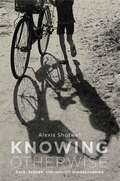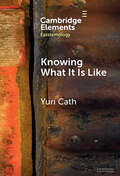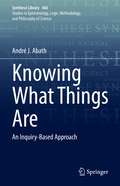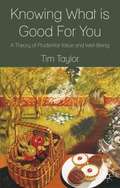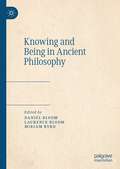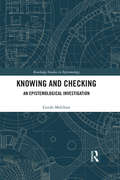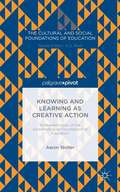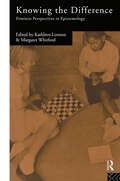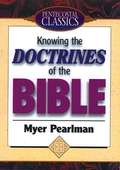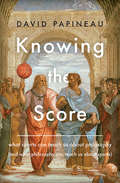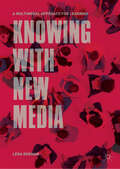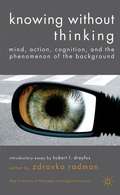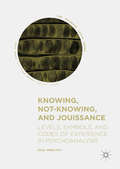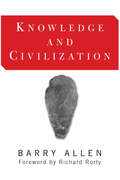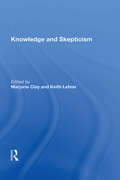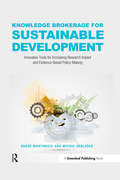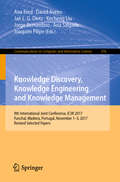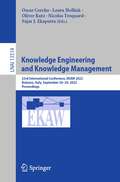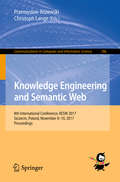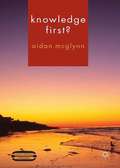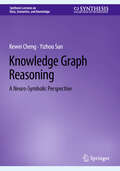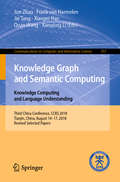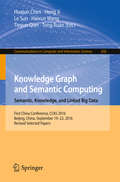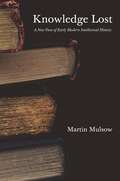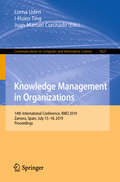- Table View
- List View
Knowing Otherwise: Race, Gender, and Implicit Understanding (G - Reference, Information and Interdisciplinary Subjects)
by Alexis ShotwellPrejudice is often not a conscious attitude: because of ingrained habits in relating to the world, one may act in prejudiced ways toward others without explicitly understanding the meaning of one’s actions. Similarly, one may know how to do certain things, like ride a bicycle, without being able to articulate in words what that knowledge is. These are examples of what Alexis Shotwell discusses in Knowing Otherwise as phenomena of “implicit understanding.” Presenting a systematic analysis of this concept, she highlights how this kind of understanding may be used to ground positive political and social change, such as combating racism in its less overt and more deep-rooted forms. Shotwell begins by distinguishing four basic types of implicit understanding: nonpropositional, skill-based, or practical knowledge; embodied knowledge; potentially propositional knowledge; and affective knowledge. She then develops the notion of a racialized and gendered “common sense,” drawing on Gramsci and critical race theorists, and clarifies the idea of embodied knowledge by showing how it operates in the realm of aesthetics. She also examines the role that both negative affects, like shame, and positive affects, like sympathy, can play in moving us away from racism and toward political solidarity and social justice. Finally, Shotwell looks at the politicized experience of one’s body in feminist and transgender theories of liberation in order to elucidate the role of situated sensuous knowledge in bringing about social change and political transformation.
Knowing What It Is Like (Elements in Epistemology)
by Yuri CathWhat kind of knowledge does one have when one knows what it is like to, say, fall in love, eat vegemite™, be a parent, or ride a bike? This Element addresses this question by exploring the tension between two plausible theses about this form of knowledge: (i) that to possess it one must have had the corresponding experience, and (ii) that to possess it one must know an answer to the 'what it is like' question. The Element shows how the tension between these two theses helps to explain existing debates about this form of knowledge, as well as puzzling conflicts in our attitudes towards the possibility of sharing this knowledge through testimony, or other sources like literature, theories, and simulations. The author also offers a view of 'what it is like' knowledge which can resolve both the tension between (i) and (ii), and these puzzles around testimony.
Knowing What Things Are: An Inquiry-Based Approach (Synthese Library #466)
by André J. AbathThis book provides an account of what is to know what things are, focusing on kinds, both natural (such as water) and social (such as marriage). It brings tools from an area that has received much attention in recent years, the epistemology of inquiry. The knowledge of what things are is to be understood as resulting from successful inquiries directed at questions of the form ‘What is x?’, where x stands for a given kind of thing. The book also addresses knowledge-wh in general (which includes knowledge-who and knowledge-where), as well as the phenomenon of ignorance regarding what things are and our obligations in respect to knowing what things are. It also brings to light new avenues of research for those interested in the relation between the knowledge of what things are and concept possession and amelioration.‘Knowing What Things Are’ should be of interest to researchers in Epistemology, Philosophy of Language, Metaphysics, Philosophy of Mind, Social Philosophy and Linguistics.
Knowing What is Good for You: A Theory of Prudential Value and Well-Being
by Tim E. TaylorAn examination of the philosophical issues surrounding prudential value: what it is for something to be good for a person; and well-being: what it is for someone's life to go well. It critically analyses competing approaches, and proposes a new subjective account that addresses key weaknesses of existing theories.
Knowing and Being in Ancient Philosophy
by Daniel Bloom Laurence Bloom Miriam ByrdThis collected volume is inspired by the work of Edward Halper and is historically focused with contributions from leading scholars in Ancient and Medieval philosophy. Though its chapters cover a diverse range of topics in epistemology, ethics, and political philosophy, the collection is unified by the contributors’ consideration of these topics in terms of the fundamental questions of metaphysics. The first section of the volume, “Knowing and Being,” is dedicated to the connection between metaphysics and epistemology and includes chapters on Heraclitus, Plato, Aristotle, and the Ancient Daoists. The second section, “Goodness as Knowing How to Be,” addresses ethics as an outgrowth of human metaphysical concerns and includes chapters on Plato, Aristotle, and Maimonides. Contributors include William H. F. Altman, Luc Brisson, Ronna Burger, Miriam Byrd, Owen Goldin, Lenn Goodman, Mitchell Miller, Richard Parry, Richard Patterson, Nastassja Pugliese, John Rist, May Sim, Roslyn Weiss, and Chad Wiener.
Knowing and Checking: An Epistemological Investigation (Routledge Studies in Epistemology)
by Guido MelchiorChecking is a very common concept for describing a subject’s epistemic goals and actions. Surprisingly, there has been no philosophical attention paid to the notion of checking. This is the first book to develop a comprehensive epistemic theory of checking. The author argues that sensitivity is necessary for checking but not for knowing, thereby finding a new home for the much discussed modal sensitivity principle. He then uses the distinction between checking and knowing to explain central puzzles about knowledge, particularly those concerning knowledge closure, bootstrapping and the skeptical puzzle. Knowing and Checking: An Epistemological Investigation will be of interest to epistemologists and other philosophers looking for a general theory of checking and testing or for new solutions to central epistemological problems.
Knowing and Learning as Creative Action: A Reexamination of the Epistemological Foundations of Education
by Aaron StollerStoller challenges the long-held view that knowing is a causal and linear act, arguing instead that the process of knowing is interdependent, transactional, and grounded in creative action.
Knowing the Difference: Feminist Perspectives in Epistemology
by Kathleen Lennon Margaret WhitfordIncluding contributions from an international list of renowned authors, this text seeks to address the controversial issue of difference in feminist philosophy, using approaches from both analytic and continental thinking.
Knowing the Doctrines of the Bible
by Myer PearlmanExplains 47 doctrines, listed in 11 major sections. Subtopics include: The nature of God, origin of man, sin, offices of Christ, atonement in the Bible, death, and justification.
Knowing the Score: What Sports Can Teach Us About Philosophy (And What Philosophy Can Teach Us About Sports)
by David PapineauIn Knowing the Score, philosopher David Papineau uses sports to illuminate some of modern philosophy's most perplexing questions. As Papineau demonstrates, the study of sports clarifies, challenges, and sometimes confuses crucial issues in philosophy. The tactics of road bicycle racing shed new light on questions of altruism, while sporting family dynasties reorient the nature v. nurture debate. Why do sports competitors choke? Why do fans think God will favor their team over their rivals? How can it be moral to deceive the umpire by framing a pitch? From all of these questions, and many more, philosophy has a great deal to learn.An entertaining and erudite book that ranges far and wide through the sporting world, Knowing the Score is perfect reading for armchair philosophers and Monday morning quarterbacks alike.
Knowing with New Media: A Multimodal Approach for Learning
by Lena RedmanThis cutting edge book considers how advances in technologies and new media have transformed our perception of education, and focuses on the impact of the privatisation of digital tools as a mean of knowledge production. Arguing that education needs to adapt to the modern learner, the book’s unique approach is based on a disassociation with the deeply ingrained attitude with which people have traditionally viewed education – learning the existing symbolic systems of certain disciplines and then expressing themselves strictly within the operational modes of these systems. The ways of knowledge production – exploring, recording, representing, making meaning of and sharing human experiences – have been fundamentally transformed through the infusion of digital technologies into all aspects of human activity, allowing learners to engage with their immediate natural, social and cultural environments by capitalising on their individual abilities and interests. This book proposes a new approach to teaching and learning termed ‘cinematic bricolage’, which involves generating knowledge from heterogeneous resources in a ‘do-it-yourself’ manner while making meaning through multimodal representations. It shows how cinematic bricolage reconnects ways of knowing with ways of being, empowering the individual with a sense of personal identity and responsibility, helping to shape more aware social citizens.
Knowing without Thinking
by Zdravko RadmanA volume devoted explicitly to the subtle and multidimensional phenomenon of background knowing that has to be recognized as an important element of the triad mind-body-world. The essays are inspired by seminal works on the topic by Searle and Dreyfus, but also make significant contribution in bringing the discussion beyond the classical confines.
Knowing, Not-Knowing, and Jouissance: Levels, Symbols, And Codes Of Experience In Psychoanalysis (The\palgrave Lacan Ser.)
by Raul MoncayoThis book explores the practice and transmission of Lacanian and Freudian theory. It discusses the pure versus applied analysis of Lacanian and Freudian theory in practice; and the hierarchical versus circular transmissions within psychoanalytic organizations.Underpinned by extensive practical knowledge of the clinic, this work examines the differences between Freud and Lacan in their understanding of the subject and the unconscious and pushes them in new directions. The book also offers an analysis and commentary of several key Lacanian texts including an accessible study of the notoriously challenging text L'etourdit. Offering both divergent and reinforcing takes on Lacan, the author explores the traits that separate out the psychoanalyst from other twentieth-century thinkers and theorists. This book offers a clear clinical picture of where Lacanian psychoanalysis is today, both in the US and internationally.
Knowledge And Civilization
by Barry AllenOffers a new, original way of framing questions about knowledge. Knowledge and Civilization advances detailed criticism of philosophy's usual approach to knowledge and describes a redirection, away from textbook problems of epistemology, toward an ecological philosophy of technology and civilization. Rejecting theories that confine knowledge to language or discourse, Allen situates knowledge in the greater field of artifacts, technical performance, and human evolution. His wide ranging considerations draw on ideas from evolutionary biology, archaeology, anthropology, and the history of cities, art, and technology.
Knowledge And Skepticism
by Keith Lehrer Marjorie ClayThis book presents the characteristic of philosophical writing in the theory of knowledge covering the major themes: skepticism, externalism, reliabilism, probability, and justification. It also analyses epistemology from both historical and contemporary perspective.
Knowledge Brokerage for Sustainable Development: Innovative Tools for Increasing Research Impact and Evidence-Based Policy-Making
by André Martinuzzi Michal SedlackoThe menace of a post-truth era challenges conventional policy-making and science. Instead of fighting an uphill battle against populist solutions, those involved in both policy-making and science have to find innovative ways to collaborate, and make use of the vast amounts of knowledge that are already available. Knowledge brokerage, in this context, is more than a simple question-and-answer game: it is a process of co-creating and re-framing knowledge. In addition, Knowledge Brokerage for Sustainable Development has to deal with trade-offs and ambiguities, as well as world-views, cultures and the preferences of stakeholder groups. This book is the first in-depth exploration of how knowledge brokerage has the potential to help manage the challenges of sustainable development across political and scientific systems. It presents a selection of innovative and practical tools to enhance the connectivity of research and policy-making on sustainable development issues. In doing so, this book will be an essential publication in research and policy-making. It supports networking among the developers and users of knowledge brokerage systems and will make their experience better known to the different communities involved.The book presents interviews with leading policymakers and researchers such as former EU Commissioner Franz Fischler, Robert-Jan Smits (Director-General of Research and Innovation at the EC), Uwe Schneidewind (President of the Wuppertal Institute), and Leida Rijnhout (European Environmental Bureau). It also provides insights into eleven EU funded projects dealing with different approaches of Knowledge Brokerage for Sustainable Development.
Knowledge Discovery, Knowledge Engineering and Knowledge Management: 9th International Joint Conference, IC3K 2017, Funchal, Madeira, Portugal, November 1-3, 2017, Revised Selected Papers (Communications in Computer and Information Science #976)
by David Aveiro Joaquim Filipe Kecheng Liu Ana Fred Jorge Bernardino Jan L. Dietz Ana SalgadoThis book constitutes the thoroughly refereed proceedings of the 8th International Joint Conference on Knowledge Discovery, Knowledge Engineering and Knowledge Management, IC3K 2017, held in Funchal, Madeira, Portugal, in November 2017.The 19 full papers presented were carefully reviewed and selected from 157 submissions. The papers are organized in topical sections on knowledge discovery and information retrieval; knowledge engineering and ontology development; and knowledge management and information sharing.
Knowledge Engineering and Knowledge Management: 23rd International Conference, EKAW 2022, Bolzano, Italy, September 26–29, 2022, Proceedings (Lecture Notes in Computer Science #13514)
by Oscar Corcho Laura Hollink Oliver Kutz Nicolas Troquard Fajar J. EkaputraThis book constitutes the refereed proceedings of the 23rd International Conference on Knowledge Engineering and Knowledge Management, EKAW 2022, held in Bolzano, Italy, in September 2022. The 11 full papers presented together with 5 short papers were carefully reviewed and selected from 57 submissions The previous event in the series, EKAW 2020, introduced a special theme related to “Ethical and Trustworthy Knowledge Engineering.” This theme is still very relevant in 2022, and thus has remained one of the core topics of the conference.The conference concerned with all aspects about eliciting, acquiring, modeling and managing knowledge, and the construction of knowledge-intensive systems and services for the semantic web, knowledge management, e-business, natural language processing, intelligent information integration, and much more.
Knowledge Engineering and Semantic Web: 8th International Conference, KESW 2017, Szczecin, Poland, November 8-10, 2017, Proceedings (Communications in Computer and Information Science #786)
by Przemysław Różewski and Christoph LangeThis book constitutes the refereed proceedings of the 8th International Conference on Knowledge Engineering and the Semantic Web, KESW 2017, held Szczecin, Poland, in November 2017. The 16 full papers presented were carefully reviewed and selected from 58 submissions. The papers are organized in topical sections on natural language processing; knowledge representation and reasoning; ontologies and controlled vocabularies; scalable data access and storage solutions; semantic Web and education; linked data; semantic technologies in manufacturing and business.
Knowledge First?
by Aidan McglynnAccording to a long tradition, questions about the nature of knowledge are to be answered by analyzing it as a species of true belief. In light of the apparent failure of this approach, knowledge first philosophy takes knowledge as the starting point in epistemology. Knowledge First? offers the first overview of this approach.
Knowledge Graph Reasoning: A Neuro-Symbolic Perspective (Synthesis Lectures on Data, Semantics, and Knowledge)
by Yizhou Sun Kewei ChengThis book provides a coherent and unifying view for logic and representation learning to contribute to knowledge graph (KG) reasoning and produce better computational tools for integrating both worlds. To this end, logic and deep neural network models are studied together as integrated models of computation. This book is written for readers who are interested in KG reasoning and the new perspective of neuro-symbolic integration and have prior knowledge to neural networks and deep learning. The authors first provide a preliminary introduction to logic and background knowledge closely related to the surveyed techniques such as the introduction of knowledge graph and ontological schema and the technical foundations of first-order logic learning. Reasoning techniques for knowledge graph completion are presented from three perspectives, including: representation learning-based, logical, and neuro-symbolic integration. The book then explores question answering on KGs with specific focus on multi-hop and complex-logic query answering before outlining work that addresses the rule learning problem. The final chapters highlight foundations on ontological schema and introduce its usage in KG before closing with open research questions and a discussion on the potential directions in the future of the field.
Knowledge Graph and Semantic Computing. Knowledge Computing and Language Understanding: Third China Conference, CCKS 2018, Tianjin, China, August 14–17, 2018, Revised Selected Papers (Communications in Computer and Information Science #957)
by Frank Van Harmelen Quan Wang Jun Zhao Jie Tang Xianpei Han Xianyong LiThis book constitutes the refereed proceedings of the Third China Conference on Knowledge Graph and Semantic Computing, CCKS 2018, held in Tianjin, China, in August 2018.The 27 revised full papers and 2 revised short papers presented were carefully reviewed and selected from 101 submissions. The papers cover wide research fields including the knowledge graph, information extraction, knowledge representation and reasoning, linked data.
Knowledge Graph and Semantic Computing: Semantic, Knowledge, and Linked Big Data
by Huajun Chen Tieyun Qian Haixun Wang Heng Ji Le Sun Tong RuanThis book constitutes the refereed proceedings of the first China Conference on Knowledge Graph and Semantic Computing, CCKS, held in Beijing, China, in September 2016. The 19 revised full papers presented together with 6 shared tasks were carefully reviewed and selected from numerous submissions. The papers are organized in topical sections on knowledge representation and learning; knowledge graph construction and information extraction; linked data and knowledge-based systems; shared tasks.
Knowledge Lost: A New View of Early Modern Intellectual History
by Professor Martin MulsowA compelling alternative account of the history of knowledge from the Renaissance to the EnlightenmentUntil now the history of knowledge has largely been about formal and documented accumulation, concentrating on systems, collections, academies, and institutions. The central narrative has been one of advancement, refinement, and expansion. Martin Mulsow tells a different story. Knowledge can be lost: manuscripts are burned, oral learning dies with its bearers, new ideas are suppressed by censors. Knowledge Lost is a history of efforts, from the Renaissance to the Enlightenment, to counter such loss. It describes how critics of ruling political and religious regimes developed tactics to preserve their views; how they buried their ideas in footnotes and allusions; how they circulated their tracts and treatises in handwritten copies; and how they commissioned younger scholars to spread their writings after death.Filled with exciting stories, Knowledge Lost follows the trail of precarious knowledge through a series of richly detailed episodes. It deals not with the major themes of metaphysics and epistemology, but rather with interpretations of the Bible, Orientalism, and such marginal zones as magic. And it focuses not on the usual major thinkers, but rather on forgotten or half-forgotten members of the &“knowledge underclass,&” such as Pietro della Vecchia, a libertine painter and intellectual; Charles-César Baudelot, an antiquarian and numismatist; and Johann Christoph Wolf, a pastor, Hebrew scholar, and witness to the persecution of heretics.Offering a fascinating new approach to the intellectual history of early modern Europe, Knowledge Lost is also an ambitious attempt to rethink the very concept of knowledge.
Knowledge Management in Organizations: 14th International Conference, KMO 2019, Zamora, Spain, July 15–18, 2019, Proceedings (Communications in Computer and Information Science #1027)
by Lorna Uden I-Hsien Ting Juan Manuel CorchadoThis book contains the refereed proceedings of the 14th International Conference on Knowledge Management in Organizations, KMO 2019, held in Zamora, Spain, in July 2019. The 46 papers accepted for KMO 2018 were selected from 109 submissions and are organized in topical sections on: knowledge management models and analysis; knowledge transfer and learning; knowledge and service innovation; knowledge creation; knowledge and organization; information systems and information science; data mining and intelligent science; social networks and social aspects of KM; big data and IoT; and new trends in IT.
